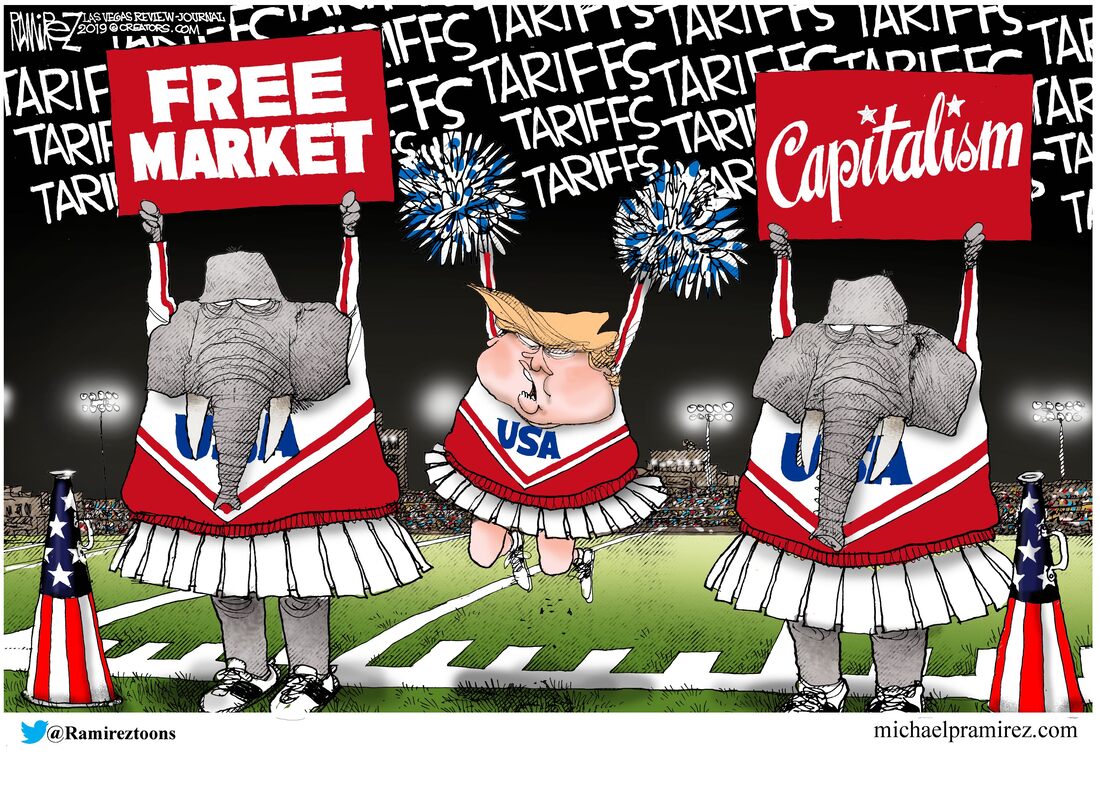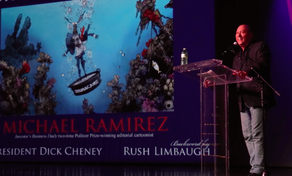|
|
|
Welcome to the official home and wonderful world of Pulitzer Prize Winning Political Cartoonist Michael P. Ramirez, daily editorial cartoonist for the Las Vegas Review Journal |
Cheers 06-02-19 Gift e-cards available now for prints and merchandise - CLICK HERE TO ORDER
Victor Davis Hanson: US-China Confrontation Will Define Global Order. Monday, May 20, 2019. Hoover Institution, Stanford University
The United States is at a crossroads with an increasingly aggressive China, which could define America’s security and the international order for decades to come, Hoover scholar Victor Davis Hanson says.
Hanson, the Martin and Illie Anderson Senior Fellow at the Hoover Institution, studies military history and the classics. Last year, Hanson won the Edmund Burke Award, which honors people who have made major contributions to the defense of Western civilization. He is the author of the 2019 book The Case for Trump, and 2017's The Second World Wars. He was recently interviewed on US policy toward China:
What is the Trump strategy behind these tariffs, short term and long term?
Hanson: Short term, Trump feels that he can take the hit of reciprocal Chinese tariffs, given that quietly his opposition, the Democrats, have been raging about Chinese cheating for decades, and, second, that the US economy is so huge and diverse that China simply cannot cause serious damage.
Remember the United States is a country one-third the size of China that produces over double China's annual gross domestic product and fields a military far more formidable with far more allies—while enjoying a far more influential global culture and a far more sophisticated system of higher education and technological innovation. China’s Asian neighbors and our own European Union allies quietly are hoping Trump can check and roll back Chinese mercantilism, while publicly and pro forma chiding or even condemning Trump's brinksmanship and his resort to fossilized strategies such as tariffs and loud jawboning.
Long term, Trump believes that if present trends are not reversed, China could in theory catch and surpass the US. And as an authoritarian, anti-democratic superpower, China's global dominance would not be analogous to the American-led postwar order, but would be one in which China follows one set of rules and imposes a quite different set on everyone else—perhaps one day similar to the system imposed on its own people within China. read more
The United States is at a crossroads with an increasingly aggressive China, which could define America’s security and the international order for decades to come, Hoover scholar Victor Davis Hanson says.
Hanson, the Martin and Illie Anderson Senior Fellow at the Hoover Institution, studies military history and the classics. Last year, Hanson won the Edmund Burke Award, which honors people who have made major contributions to the defense of Western civilization. He is the author of the 2019 book The Case for Trump, and 2017's The Second World Wars. He was recently interviewed on US policy toward China:
What is the Trump strategy behind these tariffs, short term and long term?
Hanson: Short term, Trump feels that he can take the hit of reciprocal Chinese tariffs, given that quietly his opposition, the Democrats, have been raging about Chinese cheating for decades, and, second, that the US economy is so huge and diverse that China simply cannot cause serious damage.
Remember the United States is a country one-third the size of China that produces over double China's annual gross domestic product and fields a military far more formidable with far more allies—while enjoying a far more influential global culture and a far more sophisticated system of higher education and technological innovation. China’s Asian neighbors and our own European Union allies quietly are hoping Trump can check and roll back Chinese mercantilism, while publicly and pro forma chiding or even condemning Trump's brinksmanship and his resort to fossilized strategies such as tariffs and loud jawboning.
Long term, Trump believes that if present trends are not reversed, China could in theory catch and surpass the US. And as an authoritarian, anti-democratic superpower, China's global dominance would not be analogous to the American-led postwar order, but would be one in which China follows one set of rules and imposes a quite different set on everyone else—perhaps one day similar to the system imposed on its own people within China. read more
|
|
EXTRA:
Join Dave Sussman of Whiskey Politics as he explores why Donald Trump won the 2016 Presidential election with famed historian Victor Davis Hanson. Dave is one of our favorite television personalities, and we think you'll love his conversation with our friend Victor at his home in the Central Valley of California. |
Against the Mexico Tariffs
THE EDITORS
NATIONAL REVIEW June 1, 2019 3:03 PM
President Trump speaks during a visit to the U.S.-Mexico border in Calexico, Calif., April 5, 2019. (Kevin Lamarque/Reuters)President Trump believes, not without good reason, that the Mexican government is not doing its utmost to stop the illegal flow of Central Americans crossing the U.S. border. And so he has responded with . . . a $17 billion–a–year–and–rising sales tax on Americans.
The president loves tariffs. He believes that they are an effective means of protecting American firms from unfair overseas competition and a good negotiating tool as he works to reform trade agreements that he believes are disadvantageous to Americans. But the question of who ends up actually paying any given tax is complicated. The price of those tariffs, and the retaliatory tariffs they have provoked, is very high for American companies: For example, the tariffs Beijing imposed in response to Trump’s have cost American farmers an enormous part of their export market (half of exported U.S. soybeans used to go to China; the tariffs have been a gift to Brazilian producers), but the U.S. tariffs themselves are an enormous problem, too. Many American manufacturers import raw materials and components from abroad, and complex products such as automobiles and electronics may cross the border several times in the course of production.
A 5 percent tariff on Mexican goods would notionally amount to about $17 billion on U.S. imports from Mexico, touching everything from industrial components to fruit and crude oil. In reality, it is difficult to say how much money would be raised, because buyers respond to tariffs in unpredictable ways. In any case, many of those costs will be borne by American consumers and — this cannot be emphasized enough — American businesses that rely in some part on imported inputs. More important, it would cause uncertainty around a North American supply chain that has evolved organically over many years as the result of enormous investment by American companies and their business partners.
President Trump envisions a tariff that will potentially ratchet up to 25 percent. read more
THE EDITORS
NATIONAL REVIEW June 1, 2019 3:03 PM
President Trump speaks during a visit to the U.S.-Mexico border in Calexico, Calif., April 5, 2019. (Kevin Lamarque/Reuters)President Trump believes, not without good reason, that the Mexican government is not doing its utmost to stop the illegal flow of Central Americans crossing the U.S. border. And so he has responded with . . . a $17 billion–a–year–and–rising sales tax on Americans.
The president loves tariffs. He believes that they are an effective means of protecting American firms from unfair overseas competition and a good negotiating tool as he works to reform trade agreements that he believes are disadvantageous to Americans. But the question of who ends up actually paying any given tax is complicated. The price of those tariffs, and the retaliatory tariffs they have provoked, is very high for American companies: For example, the tariffs Beijing imposed in response to Trump’s have cost American farmers an enormous part of their export market (half of exported U.S. soybeans used to go to China; the tariffs have been a gift to Brazilian producers), but the U.S. tariffs themselves are an enormous problem, too. Many American manufacturers import raw materials and components from abroad, and complex products such as automobiles and electronics may cross the border several times in the course of production.
A 5 percent tariff on Mexican goods would notionally amount to about $17 billion on U.S. imports from Mexico, touching everything from industrial components to fruit and crude oil. In reality, it is difficult to say how much money would be raised, because buyers respond to tariffs in unpredictable ways. In any case, many of those costs will be borne by American consumers and — this cannot be emphasized enough — American businesses that rely in some part on imported inputs. More important, it would cause uncertainty around a North American supply chain that has evolved organically over many years as the result of enormous investment by American companies and their business partners.
President Trump envisions a tariff that will potentially ratchet up to 25 percent. read more
|
|
|
|



